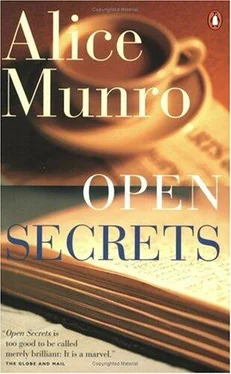Rhea and Lucille had rolled down the car windows for air. Outside was the night with the river washing out of sight, at its lowest now, among the large white stones, and the frogs and crickets singing, the dirt roads faintly shining on their way to nowhere, and the falling-down grandstand in the old fairgrounds sticking up like a crazy skeletal tower. Rhea knew that all this was there, but she couldn’t pay attention to it. More than Lucille’s talk prevented her — more than the wedding hats. She was lucky: Billy Doud had chosen her, an engaged girl was confiding in her, her life was turning out perhaps better than anybody might have predicted. But at a time like this she could feel cut off and bewildered, as if she had lost something instead of gaining it. As if she had suffered a banishment. From what?

Wayne had raised his hand to her across the room, meaning, was she thirsty? He brought her another bottle of Coca-Cola and slid down to the floor beside her. “Sit down before I fall down,” he said.
She understood from the first sip, or maybe from the first sniff, or even before that, that there was something else in her drink besides Coca-Cola. She thought that she would not drink all, or even half of it. She would just take a little drink now and then, to show Wayne that he had not flummoxed her.
“Is that all right?” said Wayne. “Is that the kind of drink you like?”
“It’s fine,” Rhea said. “I like all kinds of drinks.”
“All kinds? That’s good. You sound like the right kind of girl for Billy Doud.”
“Does he drink a lot?” Rhea said. “Billy?”
“Put it this way,” said Wayne. “Is the Pope Jewish? No. Wait. Was Jesus Catholic? No. Continue. I would not want to give you the wrong impression. Nor do I want to get clinical about this. Is Billy a drunk? Is he an alcoholic? Is he an assoholic? I mean an asshole-oholic? No, I got that wrong too. I forgot who I was talking to. Excuse please. Eliminate. Solly.”
He said all this in two strange voices — one artificially high, singsong, one gruff and serious. Rhea didn’t think that she had ever heard him say so much before, in any kind of voice. It was Billy who talked, usually. Wayne said a word now and then, an unimportant word that seemed important because of the tone in which he said it. And yet this tone was often quite empty, quite neutral, the look on his face blank. That made people nervous. There was a sense of contempt being held in check. Rhea had seen Billy try and try to stretch a story, twist it, change its tone — all in order to get Wayne’s grunt of approval, his absolving bark of laughter.
“You must not come to the conclusion that I don’t like Billy,” said Wayne. “No. No. I would never want you to think that.”
“But you don’t like him,” Rhea said with satisfaction. “You don’t at all.” The satisfaction came from the fact that she was talking back to Wayne. She was looking him in the eye. No more than that. For he had made her nervous, too. He was one of those people who make far more of an impression than their size, or their looks, or anything about them warrants. He was not very tall, and his compact body might have been pudgy in childhood — it might get pudgy again. He had a square face, rather pale except for the bluish shadow of the beard that wounded Lucille. His black hair was very straight and fine, and often flopped over his forehead.
“Don’t I?” he said with surprise. “Do I not? How could that be? When Billy is such a lovely person? Look at him over there, drinking and playing cards with the common people. Don’t you find him nice? Or do you ever think it’s a little strange when anybody can be so nice all the time? All the time . There’s only one time I’ve known him to slip up, and that’s when you get him talking about some of his old girlfriends. Don’t tell me you haven’t noticed that.”
He had his hand on the leg of Rhea’s chair. He was rocking her.
She laughed, giddy from the rocking or perhaps because he had hit on the truth. According to Billy, the girl with the veil and the purple gloves had a breath tainted by cigarette smoking, and another girl used vile language when she got drunk, and one of them had a skin infection, a fungus , under her arms. Billy had told Rhea all these things regretfully, but when he mentioned the fungus he broke into a giggle. Unwillingly, with guilty gratification, he giggled.
“He does rake those poor girls over the coals,” Wayne said. “The hairy legs. The hal-it-os-is. Doesn’t it ever make you nervous? But then you’re so nice and clean. I bet you shave your legs every night.” He ran his hand down her leg, which by good luck she had shaved before going to the dance. “Or do you put that stuff on them, it melts the hair away? What is that stuff called?”
“Neet,” Rhea said.
“Neet! That’s the stuff. Only doesn’t it have kind of a bad smell? A little moldy or like yeast or something? Yeast. Isn’t that another thing girls get? Am I embarrassing you? I should be a gentleman and get you another drink. If I can stand and walk, I’ll get you another drink.
“This has not got hardly any whisky in it,” he said, of the next Coca-Cola he brought her. “This won’t hurt you.” She thought that the first statement was probably a lie, but the second was certainly true. Nothing could hurt her. And nothing was lost on her. She did not think that Wayne had any good intentions. Nevertheless, she was enjoying herself. All the bafflement, the fogged-in feeling she had when she was with Billy had burned away. She felt like laughing at everything that Wayne said, or that she herself said. She felt safe.
“This is a funny house,” she said.
“How is it funny?” said Wayne. “Just how is this house funny? You’re the one that’s funny.”
Rhea looked down at his wagging black head and laughed because he reminded her of some kind of dog. He was clever but there was a stubbornness about him that was close to stupidity. There was a dog’s stubbornness and some misery, too, about the way he kept bumping his head against her knee now, and jerking it back to shake the black hair out of his eyes.
She explained to him, with many interruptions during which she had to laugh at the possibility of explaining, that what was funny was the tin curtain in the corner of the room. She said that she thought there was a dumbwaiter behind it that went up and down from the cellar.
“We could curl up on the shelf,” Wayne said. “Want to try it? We could get Billy to let down the rope.”
She looked again for Billy’s white shirt. So far as she knew, he hadn’t turned around to look at her once since he sat down. Wayne was sitting directly in front of her now, so that if Billy did turn around he wouldn’t be able to see that her shoe was dangling from one toe and Wayne was flicking his fingers against the sole of her foot. She said that she would have to go to the bathroom first.
“I will escort you,” Wayne said.
He grabbed her legs to help himself up. Rhea said, “You’re drunk.”
“I’m not the only one.”
The Monks’ house had a toilet — in fact a bathroom — off the back hall. The bathtub was full of cases of beer — not cooling, just stored there. The toilet flushed properly. Rhea had been afraid it wouldn’t, because it looked as if it hadn’t for the last person.
She looked at her face in the mirror over the sink and spoke to it with recklessness and approval. “Let him,” she said. “ Let him. ” She turned off the light and stepped into the dark hall. Hands took charge of her at once, and she was guided and propelled out the back door. Up against the wall of the house, she and Wayne were pushing and grabbing and kissing each other. She had the idea of herself, at this juncture, being opened and squeezed, opened and squeezed shut, like an accordion. She was getting a warning, too — something in the distance, not connected with what she and Wayne were doing. Some crowding and snorting, inside or outside of her, trying to make itself understood.
Читать дальше













